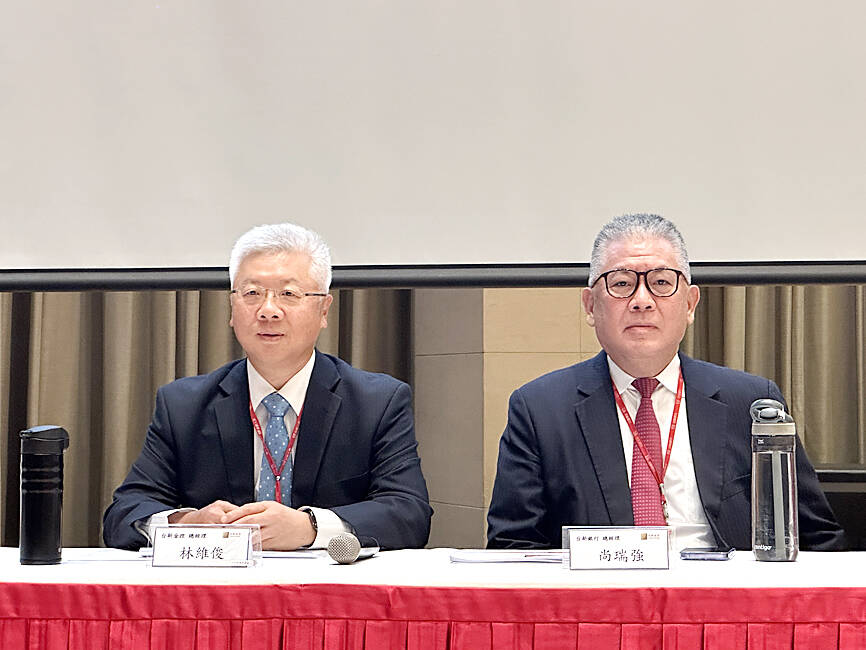Taishin Financial Holding Co (台新金控) is seeking to improve its core businesses this quarter after net profit rose more than 50 percent year-on-year to NT$12.1 billion (US$374.27 million) in the first three quarters, or earnings per share of NT$0.85, the Taipei-based conglomerate said yesterday.
The results already beat its earnings per share for the whole of last year at NT$0.55, and profit momentum would continue this quarter, Taishin said.
“All subsidiaries have fared well so far, aided by lingering benefits from acquiring Prudential Life Insurance Co of Taiwan (保德信人壽), dividend income and trading gains,” Taishin Financial president Welch Lin (林維俊) told an online investors’ conference.

Photo: CNA
Taishin Financial benefited from recovering unrealized losses in the previous year, Lin added.
A restrictive monetary environment at home and abroad allowed its net interest margin to gather 4 basis points from 1.2 percent in June to 1.24 percent in September, while its interest spread widened from 1.28 percent to 1.29 percent, Taishin Financial data showed.
Net interest margin might moderate slightly and hover at about 1.22 percent this year due to funding cost hikes, and is consistent with a slowdown in the loan-to-deposit ratio that stood at a relatively high 71.8 percent in September, officials said.
Currency swap operations would generate similar earnings this quarter as last quarter, after the US Federal Reserve and Taiwan’s central bank held interest rates steady and extended the rate differences, officials said.
The wealth management business of Taishin International Bank (台新銀行), the conglomerate’s main profit driver, might grow by double-digit percentage points this year alongside a high single-digit percentage increase in credit card operations, bank president Oliver Shang (尚瑞強) said.
Loan demand this quarter might rise by a high-single percentage with equal contributions from individual and corporate customers, Shang said.
Taishin Financial has sold almost all of its shares in state-run Chang Hwa Commercial Bank (CHB, 彰化銀行) after it ditched a long-standing effort to acquire the bank to instead turn to the life insurance sector to expand its business.
“We now have only 0.1 percent of CHB shares,” Lin said.
Taishin Life Insurance Co (台新人壽) reported NT$21.4 billion of gross premiums in the first nine months, increasing its market share from 1.7 percent last year to 1.85 percent this year, company officials said, adding that bancassurance represented the largest sales channel.
The group is taking a hit from its investment in Diamond Biofund Inc (鑽石生技), the nation’s largest investment fund focused on the biomedical industry, but said it would take a wait-and-see approach on the fund, in line with investment rules.
Taishin Financial’s venture capital unit owns a board seat at Diamond Biofund and cannot offload its stake in the first two to four years of the fund’s listing.

When an apartment comes up for rent in Germany’s big cities, hundreds of prospective tenants often queue down the street to view it, but the acute shortage of affordable housing is getting scant attention ahead of today’s snap general election. “Housing is one of the main problems for people, but nobody talks about it, nobody takes it seriously,” said Andreas Ibel, president of Build Europe, an association representing housing developers. Migration and the sluggish economy top the list of voters’ concerns, but analysts say housing policy fails to break through as returns on investment take time to register, making the

EARLY TALKS: Measures under consideration include convincing allies to match US curbs, further restricting exports of AI chips or GPUs, and blocking Chinese investments US President Donald Trump’s administration is sketching out tougher versions of US semiconductor curbs and pressuring key allies to escalate their restrictions on China’s chip industry, an early indication the new US president plans to expand efforts that began under former US president Joe Biden to limit Beijing’s technological prowess. Trump officials recently met with their Japanese and Dutch counterparts about restricting Tokyo Electron Ltd and ASML Holding NV engineers from maintaining semiconductor gear in China, people familiar with the matter said. The aim, which was also a priority for Biden, is to see key allies match China curbs the US

NOT TO WORRY: Some people are concerned funds might continue moving out of the country, but the central bank said financial account outflows are not unusual in Taiwan Taiwan’s outbound investments hit a new high last year due to investments made by contract chipmaker Taiwan Semiconductor Manufacturing Co (TSMC, 台積電) and other major manufacturers to boost global expansion, the central bank said on Thursday. The net increase in outbound investments last year reached a record US$21.05 billion, while the net increase in outbound investments by Taiwanese residents reached a record US$31.98 billion, central bank data showed. Chen Fei-wen (陳斐紋), deputy director of the central bank’s Department of Economic Research, said the increase was largely due to TSMC’s efforts to expand production in the US and Japan. Investments by Vanguard International

STRUGGLING TO SURVIVE: The group is proposing a consortium of investors, with Tesla as the largest backer, and possibly a minority investment by Hon Hai Precision Nissan Motor Co shares jumped after the Financial Times reported that a high-level Japanese group has drawn up plans to seek investment from Elon Musk’s Tesla Inc to aid the struggling automaker. The group believes the electric vehicle (EV) maker is interested in acquiring Nissan’s plants in the US, the newspaper reported, citing people it did not identify. The proposal envisions a consortium of investors, with Tesla as the largest backer, but also includes the possibility of a minority investment by Hon Hai Precision Industry Co (鴻海精密) to prevent a full takeover by the Apple supplier, the report said. The group is